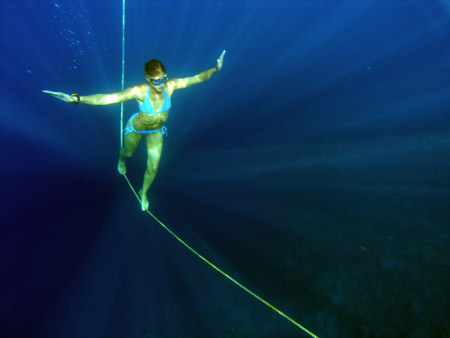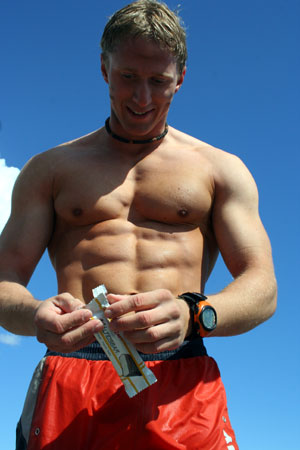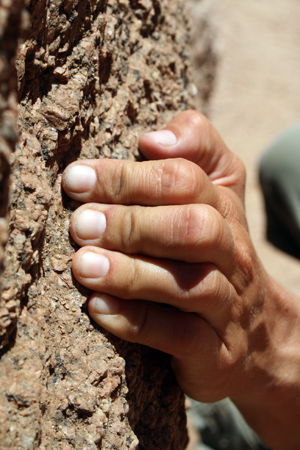 |
 |
Esoteric Sports Psychology - for freediving
Understanding, acquiring skills and shaping attitudes.
Short version of a longer text. ©
Sebastian Naslund
|
Flow |
|
|
Physical training |
|
Vision and goal setting
-
Setting a goal easy, reaching them can be difficult.
It
does not have to be a specific goal, or a number, or a
record – It is enough with a commitment to be better
than yourself, or pursuing a feeling, a vision of a
perfect dive. Numbers take care of themselves.
- Have your dream anchored down in your consciousness as
a plan.
- It is important that your ambition poses a significant
challenge. Something you just might be able to
do.
- No manual, coach, or system has the final say, you
chose what you feel is right. You set your own
standards.
- Usually it is not possible to create a true vision of
a goal until you have the understanding of the sport and
the way your body works.
- Your vision can not be bigger than the motivation or
discipline needed to achieve it.
- Have both long term and short term goals. Set general
goals, and specific goals.
- Write them down. Describe how it will fell when you
have achieved your goal.
- Tell yourself why you want to achieve this.
- Write down what you are willing to sacrifice to
achieve your goal.
|
- Write down what is missing to achieve your goal. |
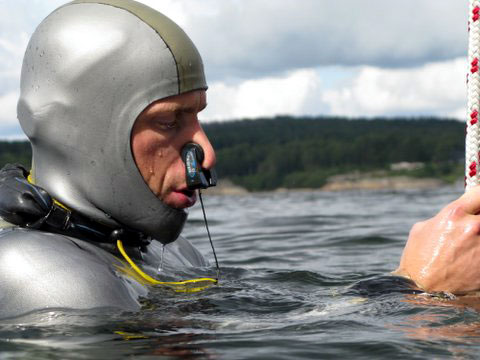 |
Confidence & motivation
-
Acknowledge that you are building a new personality. New
skills will need a new identity. Are you escaping from
another identity? That usually does not work. Why are you
doing this, who is this “new you”? - What does your a
fear of failure look like?
- And remember, at the end of the day you are not your
last results. It is not what you do, but who you are.
- Confidence.
If you don’t believe in yourself you are in “dire
straits”. Confidence is the belief that you can be
successful at a task. It will create a relaxed mental
state and a carefree approach.
- First of all remember, you are a freediver, there
are no cooler sport, just by doing it you are success.
- Once you discover that you can do PB without any
warm-up dives you will earn great confidence. Its all
there, your diving skill is ready to be deployed. Just
get in the right mood, do your desired breath up and go.
-
Fake it till you make it. Copy the best, pretend that
you are fully trained and go the full length, who knows,
it might work.
- Give yourself arguments for why you are going to
succeed.
-
In every training session you are adding a piece to the
vision.
- Understand that you are training many factors that all
together will build an athlete.
- The key attitude is to change your perception of time
– having a living conviction that small acts of today
are shaping your future.
-
See changes. Look back and see that you have changed.
Look for improvement, not perfection.
|
-
If progress is slow, remember you are building up to
an “evolutionary step”. |
|
Performance & limits
- Do
not fear anxiety/stress – if it is there - just accept
it. Observe it for a while. It is not your perceived
weakness that is the problem, it is what you feel
about your weakness.
- Be sure to have many versions of warm-ups so you can
adapt to shortness of time.
- The purpose of warm up is mainly to get in the right
mood.
- Freediving is a mystery, even with the worst of
preparations you still can perform your best if you
manage to get your emotional state right.
- When at a competition site, make this your
arena, take a walk around it, every corner, express your
right to be in the way, to be seen, stroll around the
pool, imagine yourself in the pool.
-
Do not expect a good day or an easy run. Keep it in you
mind that it will not feel nice. Expect a long,
extremely long easy phase, but do not forget the
fighting phase.
- Make sure your max attempt is the real thing, set a
date and a time (just like a comp) and start with a
countdown.
-
When exploring your limits it might be a good idea to
forget about any set goals and just focus on the right
feeling. Let the numbers come to you, instead of chasing
after them.
- It can be very daunting to go for max attempts. Just
the thought can make certain people feel the taste of
failure. You must understand that a max attempt is not a
PB attempt – it is just to try to see how far you can
swim this day under these circumstances.
- A max attempt is a way to ask yourself: who am I?
-Pushing yourself is not easy, and even painful. Seeing
the physical reactions as something biological that you
understand will enable you to endure longer. What you
understand will make not you freak you.
-
Its only freediving– just do it.
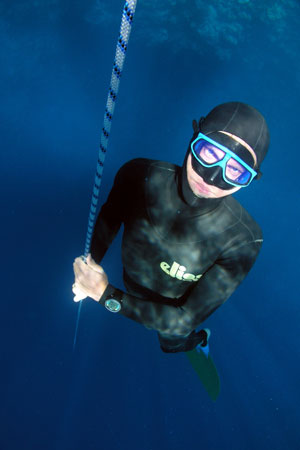 |
Body/mental awareness & relaxation - Awareness is the prerequisite for change, a necessity in order to master relaxation, or reach flow. - It will be much easier to attain this skill if you like your body. You have to emotionally grasp that your sense of self has to include your body. It is not an appendix to the brain. - Mind and body is constantly communicating and having an effect on each other, they interlace, any dirt in one part of the machinery and the other part is instantly effected. - Identify how you react to stress. Observe your thoughts and emotions when under stress. - By switching between tensioning and relaxing – relaxation will be deeper. The yoga position called “the boat” is an example. |
-
During relaxation visualize and tell your body to relax
deep in the muscles, body part by body part.
- Do psychic breathing – create a steady slow
airflow in and out by blocking slightly at the
epiglottis in the throat.
-
Get active, release energy: physical movements (jumping,
yoga, dancing, swimming, tensioning). You might even
have to use sounds, humming, singing and if applicable:
scream. You are the athlete, it’s about you, don’t care
what others think.
-
Stop, close your eyes and listen. Make a mental list of
all present sounds. Try to identify the smallest sound
of them all.
| - Chose one activity that you always do – and chose to
do it in slow motion. Like brushing your teeth, or
opening the fridge, or putting on your shoes. - Do nostril breathing. Imagine only feeling air in one nostril while breathing in – and then imagine only feeling the other nostril when breathing out. Slowly back and forth, right to left, and back. No hands involved. You can add counting of breaths as well. Start from 0 if you lose count. - Observe how you evaluate and judge everything you see: good, bad, interesting, normal, boring, weird, stupid, fascinating. How you compare your self and how you evaluate how everything relates to you. What it can, or can not do for you. |
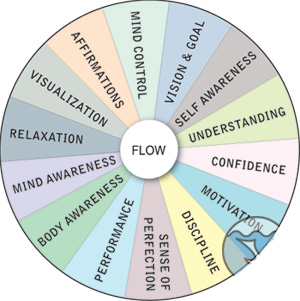 |
Visualization - creating an image in the mind.
Rehearsing a challenge beforehand by visualizing will
prepare you in a subconscious way. Do it several times,
check several alternatives, look at it from different
angles. Preparation, countdown, how it feels, how you do
everything right. How you succeed, finish it perfectly,
hear the applause. Visualize it again, see it in slow
motion, freeze certain situations where you feel
stressed or nervous, smooth it out, solve it.
Chose:
- A detailed “first person” view, or visualize it from a
third person, stepping back, getting an overview, seeing
yourself move.
- All senses or some specific ones:
Kinaesthetic (imagining how it feels when you do it),
Visual (just seeing it as a silent movie), Auditive (a
focus on the sounds), or you might be comfortable with a
more linguistic approach, talking yourself through your
performance.
- Visualization is a skill, practice by imagining
simpler things. Close your eyes now an imagine yourself
getting into your suit.
-
Close your eyes and remember your actions from the
second you woke up and onwards. Recount every movement
and thought.
|
Reprogram the situation. NLP /
Affirmations |
|
Discipline
- Plain work ethic, laziness will get you nowhere.
- Sometimes the training session of the day is nothing
but an exercise in discipline: the fact that you showed
up in gear is enough. It is not what you do, but that
you did it.
- Remember, it is not always fun.
- Short focused training, can be better than lots of
sloppy training.
- Discipline is much easier the day you realize your
brain is always looking for a short cut, the easy way
out.
 |
- Observe and understand the “quitter” inside of
you. Note the thought right before you are about to
give up. What was that thought? - Discipline is a choice to override the first inclination to do something else. - Cultivate habits, and remember, every time you break a good habit, you are stepping away from your goal. - Are you a control freak? Well, then ease off. If you are not a control freak, try becoming one. |
Sense of
perfection
– The athlete that is not looking for perfection in
every move while in regular training, will not magically
deliver it in competitive situation. Train according to
your highest intentions.
- It is about anchoring new habits in your muscular
memory, in your thought patterns, as well as getting rid
of old ones. It all comes down to care for the details.
| -
Split a movement down to its ingredients, perfecting
them and assembling them all again. The thumb, the hand,
the arm, the torso, the full movement. Again, again,
until you are not thinking anymore, until you are in the
movement. - Its not about the finishing line, the edge, the surface – it is about the process. Focus on process. It’s an attitude. - If there are too many details, you might want to bunch them in groups, simplify them and chose the most important one. For instance, to focus on a certain speed, or counting, or focus on reach - might solve technique. |
|
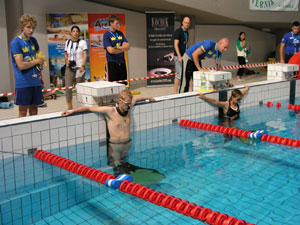 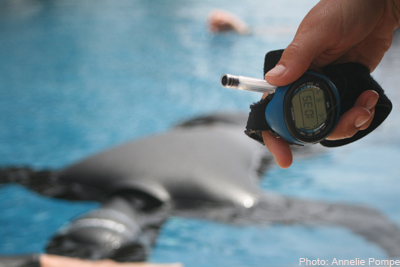 |
Coaching |

